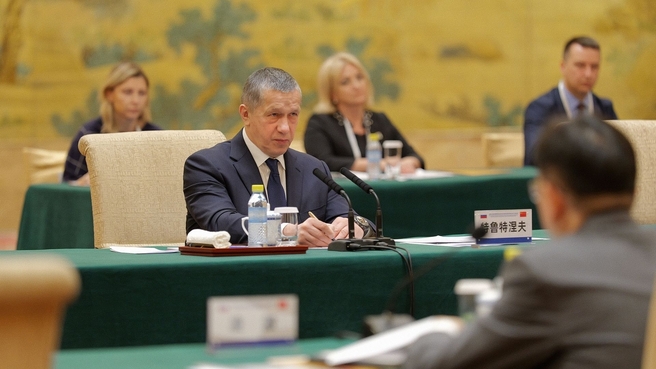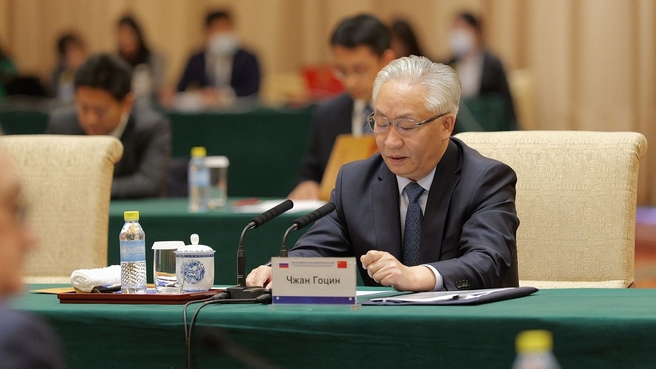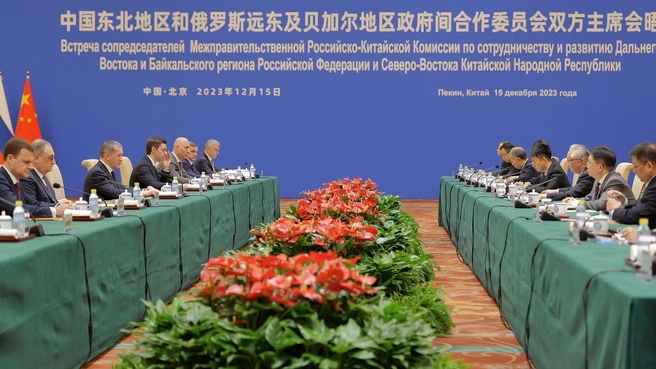
Yury Trutnev holds meeting of the co-chairs of the Intergovernmental Russian-Chinese Commission on Cooperation and Development of the Russian Far East and Northeast China
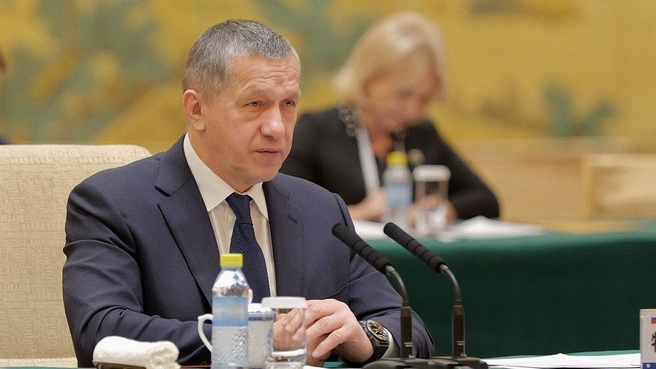
Yury Trutnev at the meeting of the co-chairs of the Intergovernmental Russian-Chinese Commission on Cooperation and Development of the Russian Far East and Northeast China
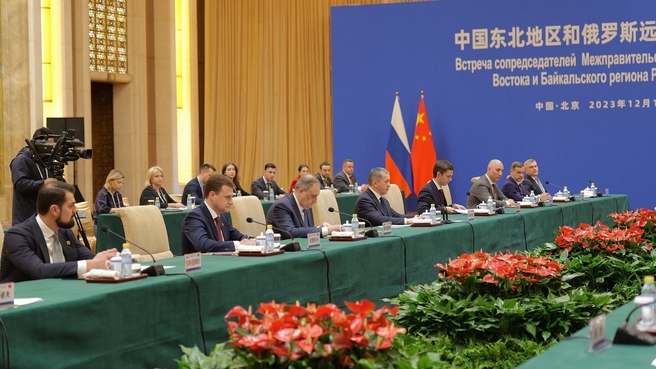
Yury Trutnev holds meeting of the co-chairs of the Intergovernmental Russian-Chinese Commission on Cooperation and Development of the Russian Far East and Northeast China
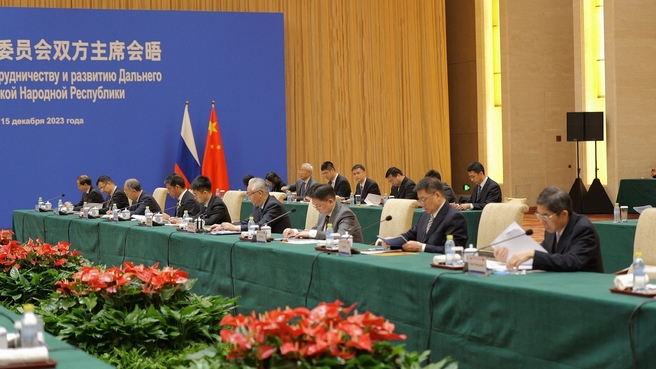
Meeting of the co-chairs of the Intergovernmental Russian-Chinese Commission on Cooperation and Development of the Russian Far East and Northeast China
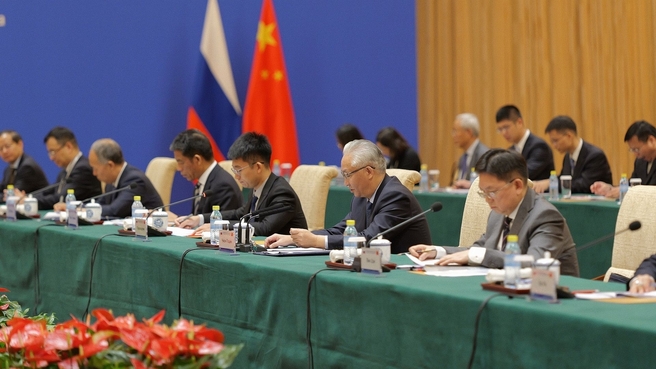
Meeting of the co-chairs of the Intergovernmental Russian-Chinese Commission on Cooperation and Development of the Russian Far East and Northeast China
Yury Trutnev holds meeting of the co-chairs of the Intergovernmental Russian-Chinese Commission on Cooperation and Development of the Russian Far East and Northeast China
Beijing hosted a meeting of the co-chairs of the Intergovernmental Russian-Chinese Commission on Cooperation and Development of the Russian Far East and Northeast China. The Russian part of the commission was headed by Deputy Prime Minister – Presidential Plenipotentiary Envoy to the Far Eastern Federal District Yury Trutnev. The Chinese part of the commission was headed by Vice Premier of the State Council of the People's Republic of China Zhang Guoqing.
“This meeting, taking place ahead of the 28th regular meeting of the Russian and Chinese heads of government, is of great importance. The world is changing rapidly. Russia is involved in the special military operation. Western states have declared an economic war on our country and imposed thousands of sanctions that aim to stop Russia’s development. All these attempts have fallen flat. Yesterday, during the Direct Line with citizens, President of the Russian Federation Vladimir Putin announced that the gross domestic product is expected to grow by 3.5 percent by the end of the year, and the economy will grow further in 2024. We know with certainty that we are defending the freedom and sovereignty of our country in the special military operation. Of course, Russia is interested in a peaceful settlement. Unfortunately, the process is complicated by the positions of the Western countries. All this leads to the destruction of economic, cultural, and human ties, as well as to a loss of trust between countries. These factors do not promote the development of humanity. Therefore, the preservation and development of the time-tested friendly ties between the Russian Federation and the People’s Republic of China creates one of the global axes stabilising the situation in the world as a whole,” Yury Trutnev said in his opening remarks.
“This year, President of China Xi Jinping and President of Russia Vladimir Putin met twice. The leaders of our states are developing a high-level strategic partnership. Political trust is building up and trade is steadily on the rise. The current session is focused on implementing the instructions of our leaders with a view to preparing the agenda for a meeting of the prime ministers. The deepening of Russian-Chinese cooperation is going on beyond the bilateral framework and acquiring global importance. This year, Russian-Chinese economic cooperation has been steadily gaining momentum. It is a new era in the development of bilateral trade and economic ties. We are steadily developing our investment cooperation and carrying out investment projects,” noted Zhang Guoqing.
The participants discussed ways of intensifying Russian-Chinese interaction in the Far East. This region is developing faster than other regions of Russia in most economic indicators like investment in fixed assets, industrial production growth, housing construction, coal and gold mining, and agricultural production.
Yury Trutnev noted the dynamics of bilateral trade and economic cooperation. “China is a key economic partner of our country in the Far East. Trade between Far Eastern regions of Russia and northeastern provinces of China is steadily on the rise. In ten years, it doubled to reach $22 billion in 2022. We expect it to reach $27 billion in 2023,” he said.
The Far East enjoys an effective system of government support – priority development territories, the free port of Vladivostok, the preferential regime of the Arctic zone and the special regime on the Kuril Islands. Chinese investors account for a big share in the portfolio of projects with foreign capital participation.
“Companies are implementing 49 investment projects worth a total of almost $9 billion with the participation of Chinese capital. In many large investment projects, Chinese companies are suppliers of technology. They are also implementing comprehensive contracts and launching facilities,” said the Russian Deputy Prime Minister.
Creation of an international priority development zone (TOR) may help expand bilateral cooperation. Russia is ready to discuss with China the terms of cooperation based on mutual interests.
Logistics infrastructure issues were considered, including the performance of the bridge crossings between Blagoveshchensk and Heihe and between Nizhneleninskoye and Tongjian. About 3.2 million tonnes of cargo passed on them in the first 11 months of this year.
The prospects of cooperation in developing the Northern Sea Route were discussed. Chinese shipping companies are already taking advantage of this international transport corridor. This year, Newnew Shipping has already made eight trips from China to the ports of Murmansk and St. Petersburg.
Tourism was a focus. Direct flights from Far Eastern cities – Vladivostok, Khabarovsk, Yuzhno-Sakhalinsk, Ulan-Ude and Yakutsk – to cities of the People’s Republic of China have been resumed. The resumption of visa-free trips for groups of Chinese tourists became an important event. Out of 37,000 Chinese tourists who visited Russia under this programme, 80 percent chose the Far East.
The holding of a regular session of the intergovernmental commission was discussed. Russian representatives suggested holding it in the Far East.
On the same day, Yury Trutnev met with representatives of Chinese companies interested in implementing investment projects in the Far East. They discussed cooperation in industry, energy, agriculture and logistics.
